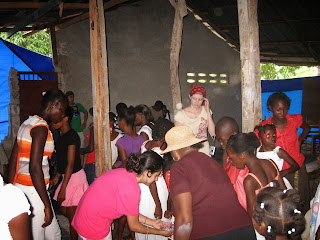In my
previous post, most excellent blogophile, I identified some pitfalls that people facilitating a paradigm shift often stumble into. As a reminder (although, come on, how long would it take you to read a 500-word post?), they were as follows:
1. Treating smart people like they're stupid.
2. Treating competent people like they're incompetent.
3. Treating committed people like they're uncommitted.
I suggested that these pitfalls could be avoided, or their impact mitigated, by a prior commitment to the second great commandment of Jesus: Love your neighbor as yourself.
Today I read, in Alan Hirsch and Tim Catchim's energizing book
The Permanent Revolution, a similar set of rules for people of a prophetic temperament. The authors are setting up a kind of taxonomy of spiritual "intelligences," the various aptitudes listed by the apostle Paul in Ephesians 4:1-16 that, taken together, are the engine of Christianity as a missionary movement through history: Apostles, Prophets, Evangelists, Shepherds (or pastors) and Teachers (APEST). Everyone, it seems, is bent toward one of these intelligences, something that appeals to the Myers-Briggs junkies among us. But the emphasis here is not on the individual but on the collective--how the five share their energies, pool their resources and engage in common mission. I'll concentrate here on prophetic intelligence, since it's related to paradigm shifting (and since that's as far as I've gotten in the book), but the greatest value in any one piece of the APEST puzzle is found in the context of the whole.
Anyway, Hirsch and Catchim define a prophet generally as a "guardian of faithfulness."
They are seen to be the God-intoxicated, biblical existentialists, calling all to live faithfully in covenant relationship with God and consistent with his kingdom and rule in the world. The effect of prophetic ministry is to bring our world into divine focus.
This presumes, all too rightly, that most of us live out of sync with what we profess about God and the world, making the prophetic intelligence a somewhat maddening burden:
This experience of encountering two contradicting realities causes the prophet to passionately call into question the existing order of things. ... By forcing us to face up to these gaps in our faithfulness, the prophet creates a context that allows us to perceive the truth of our situation. ... People, and the institutions they inhabit, can find themselves being held hostage by their own logic and systems of justification. In such situations we need prophetic imagination to deconstruct and dismantle these systems of justification that so often conceal our fears and selfishness.
Sound like a paradigm shift? It's a helpful reminder that paradigm shifts aren't just change for the alleviation of boredom; they're an acknowledgment, arrived at gradually by increasing numbers of people, that something is out of sync with reality, and a commitment, arrived at with varying levels of enthusiasm, to return to equilibrium. Paradigm shifts need prophets, not just to shake the foundations but to identify where the foundations are and how we find our way back to them.
Given this setup, prophets sound awesome, right? But they have their own rules of engagement. Hirsch and Catchim identify six.
1. The prophet is to point people to God, not to the prophet's preferred reality. There's something objective driving the prophet's concern, which is why we test prophets to distinguish between something objective and something loudly, annoyingly subjective.
2. "Criticism is not a license for cynicism." Underlying the prophetic task is a commitment to the possibility of change and to the responsibility to point people toward that change--not just to chide people for their stasis.
3. Love is the foundation of prophetic ministry. If you're not motivated by love for the people you're prophesying to, you're doing it wrong.
4. "Critical distance should not translate into permanent distance." Prophetic imagination has its own allure, and can draw us into a bubble of our own insight. No man is an island, and no prophet is without a people.
5. "Prophets are not infallible." Prophets rely on intuition, which can be wrong. Prophets, again, need the rest of us to test and approve their prophetic imaginations, just as we need prophets to keep pushing our buttons.
6. Prophets can make a situation worse. Prophets have a responsibility to their own message, to keep refining it and asking questions of it and considering the pitfalls of it. There's nothing worse than a prophet who doesn't know what she's talking about.
Anyway, that's how Hirsch and Catchim see it. It's a tragedy when prophets get stoned, or killed, or marginalized or suppressed. But sometimes, when they lose sight of these rules, a little suppression might be in order. Prophets aren't messiahs, after all. They work for us, just like we work for us.

























